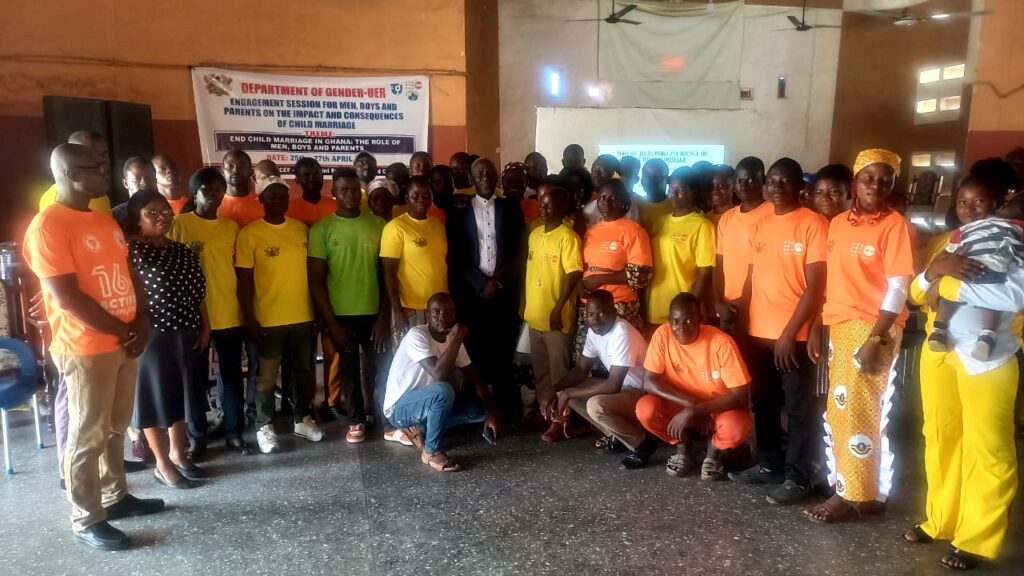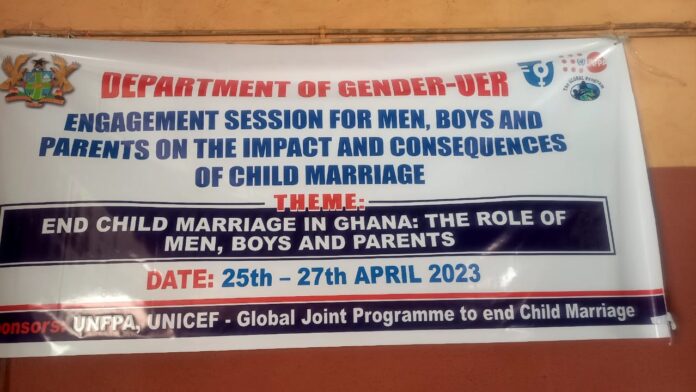The establishment of men, boys, and parents’ groups on ending Gender Based Violence in 36 communities in six districts of the Upper East Region including Nabdam, Talensi, Bongo, Builsa South, Bawku West, and Kassena Nankana West as part of a UNFPA/UNICEF-Global joint program to end child marriage is helping to change norms and attitudes in the beneficiary communities.
The program is being implemented in partnership with the Department of Gender in the Upper East Region with the aim of drastically reducing child marriage and other forms of Gender-Based Violence.
Gender-based violence is deeply rooted in inequality, culture, and norms formed over time and involves violence committed against a person with women and girls being the majority of the victims of these crimes which include rape, defilement, harassment, and early marriage among others.
Formation of the men, boys, and parents’ groups in communities was therefore to recognize the critical role, men, boys, and parents can play in ending all forms of Gender-Based Violence including child marriage.
In the current situation, child marriage is mostly a result of teenage pregnancy. With teenage pregnancy numbers still significantly high, concerns are that this will trigger more girls going into marriage.
These groups, in some of the communities, are gradually accepting and working to change certain attitudes and norms in the various communities.
Hannah Bukari, a member of the Men, boys and Parents’ group in Nangodi, a community in the Nabdam District said the activities of the group are helping them to make changes and make the necessary interventions to solve some issues at the community level.
Speaking to Dreamz News at an engagement session for men, boys, and parents on the impact and consequences of child marriage held in Bolgatanga, she said prior to the formation of the group, many of them held the view that girls who get pregnant are due for marriage adding, they have come to realize the role boys can play in preventing teenage pregnancy and child marriage hence the involvement of boys and men in educational activities.
She, therefore, called for the scaling up of the activities to many communities in the area.
“They came to educate us a lot about certain things. How to interact with our children, how to go about certain things. We thought that if a girl is pregnant, we should allow them to marry but now, they made us understand even if a girl is pregnant, there’s a second chance. We thought that girls give themselves out and we are now made to understand that both boys and girls need to be educated to understand the need to avoid STIs, teenage pregnancy, and early marriage.
As part of our activities, we go to youth bases, churches. Also, they educated us on how to manage rape and defilement cases and how we can go about with the case.” She stated.

Another Member of the group and a Youth Advocate, Bismark Ajaeribana from Mirigu in the Kassena Nankana West District, shared a similar tale, adding the activities of the group highlight the need for a collective effort to protect vulnerable girls.
“Initially, we were trying to say that when it comes to child marriage, then you should go and tackle the ladies or the girls. But we have realized that the girls are actually victims and not the cause. The program has made us know that as boys, we have a role to play. It is actually the men who impregnate the girls so when it started, it helped us stop some child marriage issues in our community. The was an instance we stopped a young girl from getting married and she is now back in school,” he stressed.




